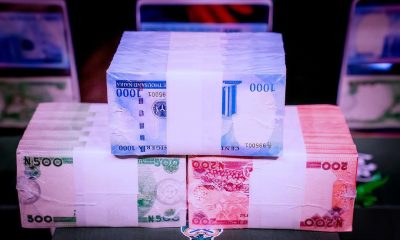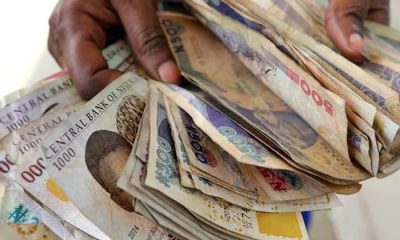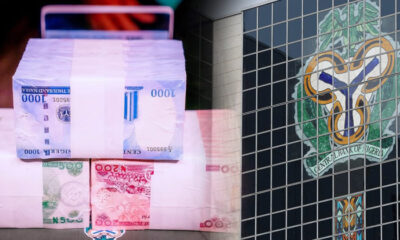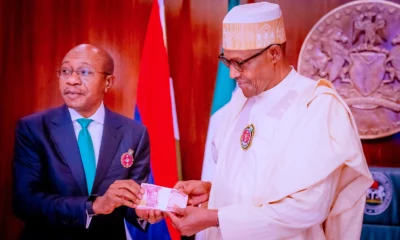NEWS
Jail Term For Abusers Of Naira Notes

CBN, also “cautioned Nigerians against abusing the Naira notes, warning that anyone caught would risk six months imprisonment or pay a fine of N50,000.”
Nigerians who have been concerned about the quality of Naira notes in circulation are familiar with CBN’s sporadic reminders of what awaits offenders, but are yet to witness any arrest, prosecution and conviction.
This is notwithstanding the fact that in this country, people openly and brazenly abuse the Naira. A visit to a typical social function would show the hawking of mint notes, spraying of notes dancing and matching on the notes.
It doesn’t even matter that the ceremony is sometimes organised by officials of government, CBN, banking institutions, chieftains of industries and commerce and even security agencies who are among those who should have prevented or at least frowned at such abusive practices.
The unwholesome practice of hawking, spraying of, dancing and matching on notes at social events significantly fuel the abuse and degradation of the notes. The effect of these is that within a short time of issuance of mint notes by the CBN, the notes become an eye-sore and if not quickly withdrawn and reprinted, a national disgrace and embarrassment ensue.
It is essential to recall that according to Section 21(3) of CBN Act 2007 “spraying of, dancing or matching on the Naira or any note issued by the Bank (CBN) during social occasions or otherwise howsoever shall constitute an abuse and defacing of the Naira or such note and shall be punishable under Sub-section 1 of this section.”
The law, in Section 5 (i) goes further to define “Matching” to include “spreading, scattering or littering of any surface with any Naira notes or coins and stepping thereon, regardless of the value, volume, occasion or intent” while in 5(ii) “Spraying” includes adorning, decorating or spraying anything or any person or any part of any person or the person of another with Naira notes or coins or sprinkling or sticking of Naira notes or coins in a similar manner regardless of the amount, occasion or the intent.”
In Section 21(4), it is also a punishable offence for “any person to hawk, sell or otherwise trade in the Naira notes, coins or any other note issued by the Bank.”
The stated offences above are punishable under Sub-section 21(1) which provides, among other things that, a person “shall on conviction be liable to imprisonment for a term not less than six months or to a fine not less than N50,000 or to both such fine and imprisonment.”
The above robust legal provisions that should have protected the notes from abuse are today being observed more in the breach than in compliance.
Quite disappointingly, CBN and the security agencies have had their eyes glue-closed while the nation and its inhabitants suffer from preventable abuses of the national currency.
As it were, the law against abuse of Naira has been in place for over a decade, yet the CBN is still at the stage of “awareness creation” and “sensitisation” of the citizens.
If after a decade the nation is stuck still at these stages, when would enforcement commence? As experience has shown, deterioration (arising from abuses) in the quality of the currency notes, including those dispensed by Automated Teller Machines (ATMs) and ones withdrawn across banks’ counters, have turned from bad to worse.
What the country needs now to put a stop to abusive practices on the Naira notes and to restore dignity is no longer a mere sporadic reminder to the public of what the law provides. Just because of the poor level of financial literacy in the country, awareness creation may still be needful in different indigenous languages but it must be consistent and long-tenured.
Beyond this basic need that ought to have been undertaken years past, subsisting exigencies demand commencement of diligent enforcement of the law. But enforcement of the law, if anything, is not for CBN alone. Law enforcement agents should brace up and perform their legitimate primary roles to save the Naira notes from pervasive abuses.
For general prevention of abuse of the Naira, all citizens and residents have roles to play. But as is well known, extreme challenges require extreme measures. The abuse has become an extreme problem.
Therefore, it necessitates extreme attention in the following ways: First, CBN must take interest in identifying and putting to death the cartel that has hijacked mint notes meant to be withdrawn from banks. Second, hawkers of the notes at social functions should be arrested and prosecuted.
Third, celebrants and their guests who dance and match on notes should also be made to face the law. Fourth, guests at functions who spray money at such occasions, whether they join in the dancing and matching on notes or not, should also be made to face the law.
Also, CBN should be sensitive and responsive in withdrawing from circulation degraded notes. It should also ensure such bad notes do not find their way, through the back door, into circulation.
Sixth, officials of regulatory bodies and operators in the banking and finance sector as well as law enforcement agencies who organise functions where Naira is abused should be punished specially because of the bad example they set.
Law enforcers who take undue advantage and derive personal benefits from failure to remedy this challenge should also be given exemplary sanctions. Provisions of the law should, therefore, be enhanced for these purposes.
Until concrete, overt and deterrent enforcement actions are taken against culprits, the abuse on the Naira will continue rather than abate. There is no better time to deal with the long overdue menace than now so that Nigerians will become proud of their legal tender.

















